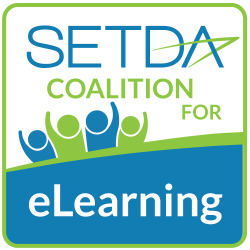Home Access: Working Toward Digital Equity
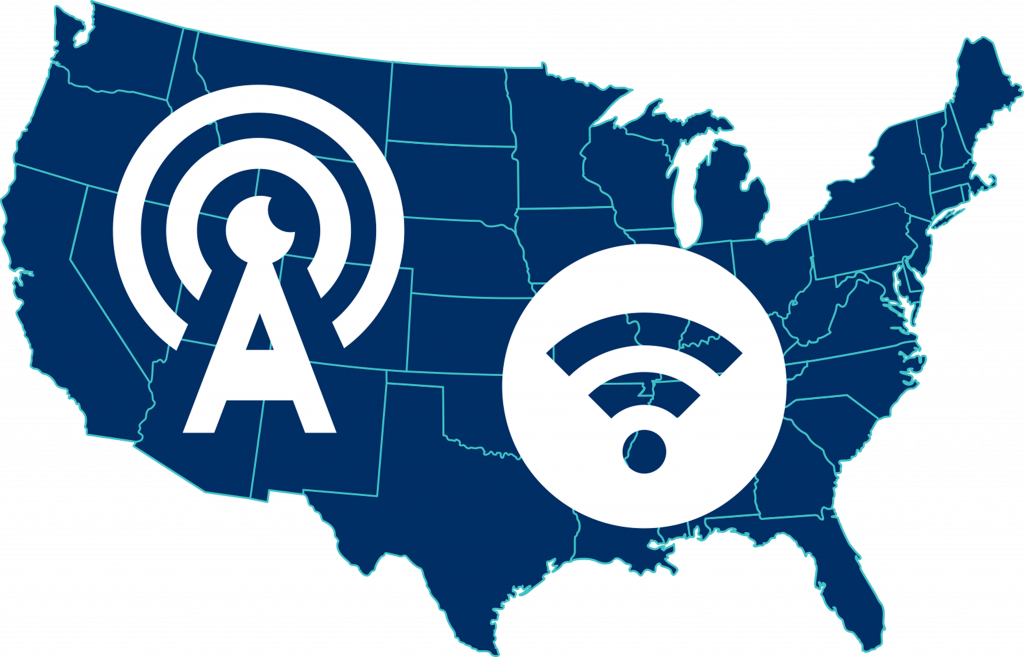
Off-campus access for educators and students is essential for ensuring equitable access to digital tools and resources for all students. As instructional materials continue to shift to digital, where content may be exclusively available online, students must have access to broadband and devices outside of school, particularly at home, to be successful. Consider reviewing SETDA’s various Equity of Access Resources for additional research and examples.
 Advocacy
Advocacy
SETDA is collaborating with a variety of organizations to advocate to close the “Homework Gap” by ensuring additional funding for broadband access to the home. Visit SETDA’s Homework Gap page to stay update on legislation and federal funding opportunities.
E-Rate Progam to Support Off Campus Access
- The FCC and NARUC released this letter, which highlights resources aimed at building public awareness about Lifeline. Lifeline is an FCC Universal Service Fund program that provides qualifying low-income consumers with monthly discounts on Internet or phone service.
- FCC Confirms – Public Use of School and Library Wi-Fi Networks Permitted
The FCC confirmed that closed schools may allow access to E-Rate funded services “to community members who access the Internet while on a school’s campus” so long as they do not charge for the use of the service.
Broadband Access: Schools can also help provide lower-income households with affordable options for connectivity via a variety of company programs which are usually based on student eligibility for free or reduced lunch.
COVID – 19 Special Promotions
Per the FCC’s Keep Americans Connected Pledge, multiple companies are offering free or discounts promotions to support students and educators. Here is a list of SETDA partner promotions. You can access a larger list of national programs and state equity programs to support off-campus access.
- Update to AT&T Keep Americans Connected Pledge
Consistent with FCC Chairman Pai’s “Keep Americans Connected Pledge,” AT&T will continue to support our customers. Through June 30, 2020, for residential or small business customers who notify us that they are unable to pay their bills due to disruptions caused by the coronavirus pandemic, we will:- Not terminate any postpaid wireless, home phone or broadband residential or small business account.
- Waive any late payment fees for postpaid wireless, home phone or broadband residential or small business, U-verse TV or DIRECTV customer.
- Waive domestic postpaid wireless plan overage charges for data, voice or text for residential or small business wireless customers.
- Keep our public Wi-Fi hotspots open for anyone who needs them.
- AT&T is waiving of usage policies applies to both its internet wireline and fixed wireless internet customers. AT&T also offers low-cost wireline home Internet service to qualifying households for $10 a month AT&T Access program. Schools should refer to their AT&T Public Sector sales representative. If you do not know who your representative is, call 888-740-4158. Please visit the AT&T COVID-19 website, where offers and resources are announced and updated.
- Cox Communication is offering to fast-track the qualification process for Connect2Compete. Schools are being asked to contact [email protected] with a list of eligible low-income students that currently do not have an internet connection. Cox will assist in getting students qualified quickly so they can continue learning from home. Cox has also partnered with PCs for People where families can purchase discounted refurbished computers. More information can be found here: https://cox.pcsrefurbished.com/
- Not terminate service to any residential or small business customer because of an inability to pay their bills due to disruptions caused by the coronavirus pandemic.
- Waive any late fees that residential or small business customers incur because of their economic circumstances related to the coronavirus pandemic.
- Open Cox Wifi hotspots to help keep the public connected in this time of need.
- ENA is available to assist communities with their own crisis management procedures and help them implement tools, such as Video Collaboration Powered by Zoom, a video conferencing solution that is available on a monthly basis without subscription, that minimize risk and improve operations as they make the shift to eLearning, telehealth, or remote work. Also, ENA SmartVoice, highly resilient, cloud-based communications service is available to keep your staff and faculty connected anytime and anywhere, especially during a crisis or emergency. ENA can provide special, no commitment service options to enable our ENA SmartVoice Go smartphone app as part of your emergency response plans and communications strategies.
- Kajeet: SmartSpot – LTE hotspots: Bundle of Kajeet SmartSpot with CIPA-compliant custom LTE data on any carrier network. Minimum 4 month term. 2GB / device / month, pooled across devices, across carriers and over term. Available on VZW, ATT, TMO, Sprint, US Cellular, Bell Mobility. Starting as low as $156 each. https://www.kajeet.net/distance-learning-contact
- Mobile Beacon currently offers a variety of 4G-enabled devices with prices ranging from $62 to $200 (plus shipping and handling). Full details on the features for each device can be located here. Mobile Beacon’s mobile broadband service provides unlimited, unthrottled data for $10/month (paid annually in advance, $120/year per device). Customers have access to a free content filtering tool upon request.
- Other National Programs for Discounted Home Access
National Research
SETDA has a track record for research and reporting on digital equity and broadband access both at school and at home.
Additional Links and Resources:
-
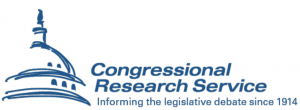
State Broadband Initiatives: Selected State and Local Approaches to Address the Digital Divide
State Broadband Initiatives: Selected State and Local Approaches as Potential Models for Federal Initiatives to Address the Digital DivideThe Congressional Research Service issued the following report highlighting models of state broadband leadership and solutions to inform plans around efficiently delivering broadband to all areas, especially under-served regions: State Broadband Initiatives: Selected State and Local Approaches as Potential Models for Federal Initiatives to Address the Digital Divide https://crsreports.congress.gov/product/pdf/R/R46307 The report is a close cousin […]
-
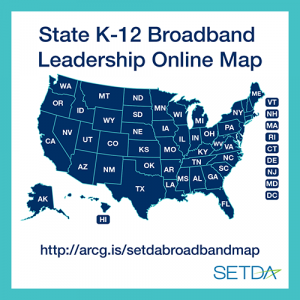
State K12 Leadership Broadband Map
This online story map provides real time details regarding State K-12 Broadband Leadership. The story map includes the following details: state leadership, state network details, regional network details, alternative model details, state strategies & state broadband funding
-
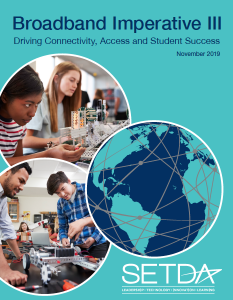
The Broadband Imperative III: Driving Connectivity, Access and Student Success
This report advocates for equitable, reliable, robust broadband access both on and off campus to prepare all students for life and work. This report builds upon SETDA’s earlier work, including the groundbreaking Broadband Imperative series of reports and State Broadband K12 Leadership reports. This publication discusses innovative technologies and pedagogical approaches to personalize learning for […]
-
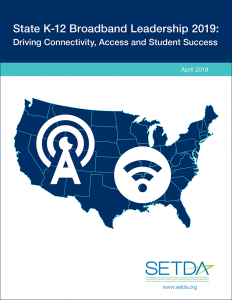
Broadband State Leadership 2019
SETDA’s report, State K-12 Broadband Leadership: Driving Connectivity, Access and Student Success highlights the importance of state leadership and the various ways states strive to support districts and schools to achieve equitable digital learning opportunities for all students both on campus and outside of school.
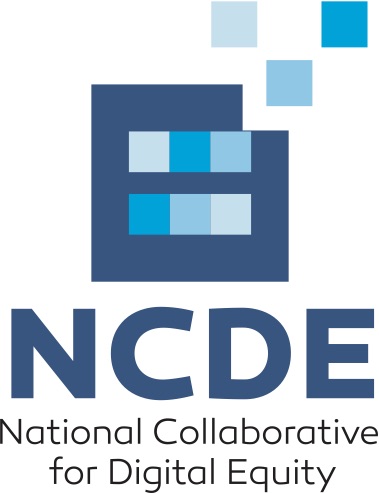
National Collaborative for Digital Equity (NCDE) works to eliminate the digital divide as a barrier to economic and educational opportunity. Specifically, they work to assist learners to develop the skills for lifelong learning and living wage career opportunity. Banks can use CRA (Community Reinvestment Act) and/or philanthropic resources to finance home computers and other e-learning essentials for low-income learners of all ages in CRA-eligible communities. Schools’, colleges’ and other educational leaders can see if their students qualify under CRA through our national map of CRA-eligible communities nationwide. Learn more about options for CRA funding for eLearning Days.


